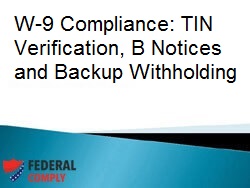About Course
Watch RECORDED Session for Just $49

Duration: 90 Minutes
Accessible On: Any multimedia device
Recorded On: Jan 27, 2022
Access any day, anytime, unlimited times as per your convenience*.
Sr. No. 001012722
Obtaining Form W-9 is the first step in assuring compliance in information return reporting requirements. The Form provides information required to determine if the business needs to file an information return as well as the correct name and tax ID number (TIN) to use when a return is required. Establishment and implementation of procedures that provide for TIN solicitation, TIN verification, response to IRS notices and backup withholding are keys to efficient processing, avoiding errors or missing information, and establishing reasonable cause for penalty avoidance when errors occur. Issuers of information returns, including 1099 Forms, can adopt best practices and procedures that streamline the process and provide assurance that 1099s are correct. This is particularly true with regard to vendor names and tax ID numbers (TINs). While certain errors in reporting dollar amounts are considered “inconsequential” under de minimis error rules, errors in the payee name or TIN are never considered inconsequential and can result in penalties. Best practices to avoid errors and penalties include TIN solicitation, TIN verification, timely and appropriate response to IRS notices, B-Notices and procedures to implement and discontinue backup withholding as required.
This webinar discusses how to establish procedures and best practices, including name/TIN verification, that avoid situations that can lead to penalties or, when such situations occur, establish the reasonable cause defense that allows your company to avoid penalties. The webinar will discuss the solicitation process including TIN solicitation, effective use of Form W-9, annual solicitations, B-notices, solicitations in response to IRS notices, and what to do when the vendor does not provide a TIN or provides an incorrect TIN. It will cover how to register to use the IRS TIN verification service, how the system matches names and numbers and how this can help in preparing submissions to prevent false positive or negative responses from the system. It will cover how to submit TINs for verification and what to do when the system indicates a mismatch between the name and number of the vendor. Procedures related to IRS notification of a name number mismatch or proposed penalties for incorrect information returns are also covered including procedures the payer must follow in issuing B-Notices to payees. The session will discuss establishment of procedures for proper administration of backup withholding.
Session Highlights:
- Know when Form W-9 must be signed
- Be aware of exemptions from Backup withholding and FATCA reporting
- Be prepared for anticipated changes to electronic filing for 2022 Forms in 2023
- Understand the de minimis error rules
- Be aware of common information return errors and know how to avoid them
- Understand backup withholding: What it is; When to start and when to stop;
- Know how to deposit and report backup withholding.
- Know the due diligence procedures to avoid penalties for missing or incorrect payee tax ID numbers
- Be aware of the procedures for “B” notices: When and how to issue and follow-up
- Understand how to use Form W-9 to document vendor as reporting status
- Taxpayer identification number basics: Which number to use
- Form W-9: documentation that establishes reportable and non-reportable payees
- Due diligence procedures avoid or mitigate penalties
- TIN verification as a best practice to clear up potential problems
- How to handle missing or incorrect payee tax ID numbers
- “B” notice procedures – responding to IRS CP2100/2100A notices
- Penalties for late or incorrect 1099 Forms
- Procedures and policies that establish “reasonable cause” and avoid penalties
- Exceptions that eliminate or mitigate penalties
Why You Should Attend:
With annual increases in information return penalties, it is more important than ever to prepare information returns correctly and file them on time. Preparation well in advance of the filing season is critical. The IRS recently released proposed regulations regarding the reduction of the e-filing thresholds for information returns. This session will provide the latest information available regarding the proposed regs and what to do to prepare for compliance under final regulations.
Who Should Attend:
- CFOs and controllers
- Accounts payable and accounting managers
- Accounts payable processing professionals
- Employers and Business owners
- Purchasing managers and professionals
- Public accountants, CPAs and Enrolled Agents
**In this Recorded Session, you can listen to Q&A which includes direct answers from our expert speaker.
*Instruction kit to access the session will be emailed within 12 hours.

